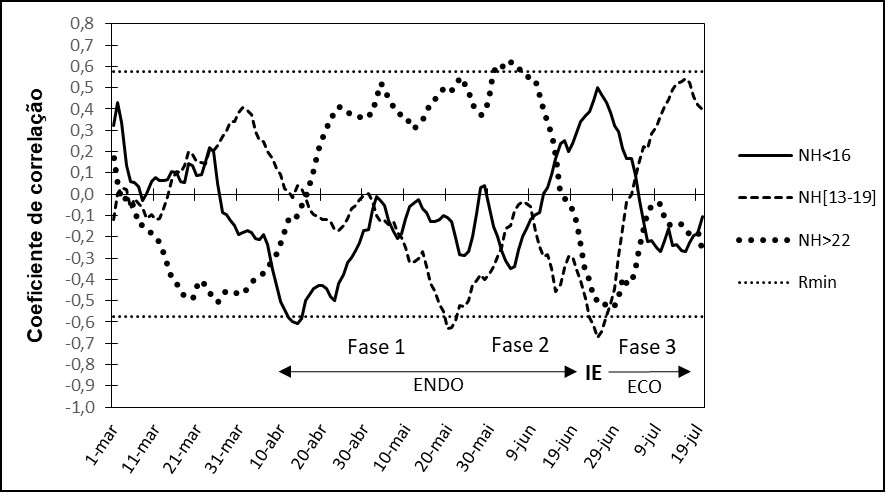Variation in the full bloom date of peach tree as a function of endo- and ecodormancy temperatures
a theoretical model
DOI:
https://doi.org/10.52945/rac.v36i1.1538Keywords:
Prunus persica, dormancy, chill hoursAbstract
This study evaluates the influence of thermal variables, before and after the estimated date of ecodormancy onset, on the variation in average full bloom dates (DMPF) of peach trees in Urussanga, Santa Catarina, Brazil. Theoretical endodormancy phase lasted approximately 70 days. Average maximum temperature of the last 30 days of endodormancy and the average of the first 20 days of ecodormancy showed the highest correlations with DMPF, with R = 0.88 (P ≤ 0.01) and R = −0.69 (P ≤ 0.05), respectively. A linear regression model with the maximum temperatures of the theoretical endodormancy phase and the average temperatures of the first 20 days of echodormancy explained 96% of the observed DMPF variations. Temperatures below 16oC in the first 40 days of endodormancy, below 22oC in the last 30 days, and above 13oC in the first 20 days of ecodormancy showed negative correlations with DMPF and together explained 93% of the observed variations. Median temperatures (13ºC to 19oC) in the final endodormancy stage had a greater influence on DMPF anticipation than temperatures below 13oC.
Metrics
Publication Facts
Reviewer profiles N/A
Author statements
- Academic society
- Epagri - Revista Agropecuária Catarinense
- Publisher
- Empresa de Pesquisa Agropecuária e Extensão Rural de Santa Catarina - Epagri
References
ALONSO, J.M.; ANSÓN, J.M.; ESPIAU, M.T.; COMPANY, R.S.i. Determination of endodormancy break in almond flower buds by a correlation model using the average temperature of different day intervals and its application on the estimation of chill and heat requirements and blooming date. Journal of the American Society for Horticultural Science, v.130, n.3, p.308-318, 2005. Doi: https://doi.org/10.21273/JASHS.130.3.308
ANZANELLO, R.; FIALHO, F.B.; SANTOS, H.P. dos. Chilling requirements and dormancy evolution in grapevine buds. Ciência e Agrotecnologia, Lavras, v.42, n.4, 2018. Doi: https://doi.org/10.1590/1413-70542018424014618
ANZANELLO, R.; SANTOS, H.P. dos; FIALHO, F.B. Influência das gemas laterais sobre a brotação da gema apical em ramos de macieira. Applied Research & Agrotechnology, Guarapuava-PR, v.13, 2020. Doi: https://doi.org/10.5935/PaeT.V13.e6422
BARBETTA, P.A.; Estatística aplicada às Ciências Sociais. 7 ed. Florianópolis: Editora da UFSC, 2010. 320p.
CAMARGO ALVAREZ, H.; SALAZAR-GUTIÉRREZ, M.; ZAPATA, D. et al. Time to-event analysis to evaluate dormancy status of single-bud cuttings: an example for grapevines. Plant Methods, v.14, n.94, 2018. Doi: https://doi.org/10.1186/s13007-018-0361-0
CAMPOY CORBALÁN, J.A. Letargo invernal en albaricoquero (Prunus armeniaca L). Análisis de diversos factores que afectan su evolución. 2009. 247f. (Doutorado). Cartagena, Universidade Politécnica de Cartagena.
CAMPOY, J.A., RUIZ, D., NORTES, M.D.; EGEA, J. Temperature efficiency for dormancy release in apricot varies when applied at different amounts of chill accumulation. Plant Biology, v.15, p.28–35, 2012. Doi: https://doi.org/10.1111/j.1438-8677.2012.00636.x
CHAAR, J.; ASTORGA, D. Determinación del requerimiento de frío y de calor en duraznero mediante un modelo de correlación. Revista de Investigaciones Agropecuarias, v.38, n.3, p.289-298, 2012.
DENNIS JR., F.G. Problems in standardizing methods for evaluating the chilling requirements for the breaking of dormancy in buds of woody plants. HortScience, v.38, n.3, 2003. Doi: https://doi.org/10.21273/HORTSCI.38.3.347
EPAGRI. Manual de produção da uva Goethe. Florianópolis, SC, 2021. 108p. (Epagri. Sistema de Produção, 54).
EREZ, A., COUVILLON, G.A. Characterization of the influence of moderate temperatures on rest completion in peach. Journal of the American Society for Horticultural Science. v.112, n.4, p.677-680, 1987.
FADÓN, E.; FERNANDEZ, E.; BEHN, H.; LUEDELING, E. 2020. A conceptual framework for winter dormancy in deciduous trees. Agronomy, v.10, n.2, 2020. Doi: https://doi.org/10.3390/agronomy10020241
FISHMAN, S., EREZ, A.; COUVILLON, G.A. The temperature dependence of dormancy breaking in plants: mathematical analysis of a two step model involving cooperative transition. J. Theor. Biol., v.124, p.473-483, 1987.
GUILLAMÓN, J.G.; PRUDENCIO, A.S.; YUSTE, J.E.; DICENTA, F.; SANCHEZ-PEREZ, R. Ascorbic acid and prunasin, two candidate biomarkers for endodormancy release in almond flower buds identified by a nontargeted metabolomic study. Horticulture Research, v.7, n.203, 2020. Doi: https://doi.org/10.1038/s41438-020-00427-5
MELKE, A. The physiology of chilling temperature requirements for dormancy release and bud-break in temperate fruit trees grown at mild winter tropical climate. Journal of Plant Studies, Toronto, v.4, n.2, 2015. Doi: https://doi.org/10.5539/jps.v4n2p110
NANNINGA, C.; BUYARSKI, C.R.; PRETORIUS, A.M.; MONTGOMERY, R.A. Increased exposure to chilling advances the time to budburst in North American tree species. Tree Physiology, v.37, p.1727–1738, 2017. Doi: https://doi.org/10.1093/treephys/tpx136
OKIE, W.R.; BLACKBURN, B. Increasing chilling reduces heat requirement for floral budbreak in peach. Hortscience, Alexandria, v.46, n.2, p.245-252, 2011. Doi: https://doi.org/10.21273/HORTSCI.46.2.245
PLETSERS, A., CAFFARRA, A., KELLEHER, C.T. ; DONNELLY, A. Chilling temperature and photoperiod influence the timing of bud burst in juvenile Betula pubescens Ehrh. and Populus tremula L. trees. Annals of Forest Science, v.72, n.7, p. 941–953, 2015. Doi: https://doi.org/10.1007/s13595-015-0491-8
POLA, A.C.; DELLA BRUNA, E.; PETRY, H.B.; MORETO, A.L. Florescimento precoce em pessegueiro e sua relação com a temperatura: um estudo de caso. Agropecuária Catarinense, v.32, n.1, p.70-74, 2019. Doi: https://doi.org/10.22491/RAC.2019.v32n1.9
POLA, A.C.; DELLA BRUNA, E.; PETRY, H.B.; MORETO, A.L. Dinâmica da dormência de gemas reprodutivas e vegetativas de pessegueiro em um clima subtropical. Horticultura Argentina, Buenos Aires, v.41, n.105, 2022.
YOUNG, E. Timing of high temperature influences chilling negation in dormant apple trees. J. Am. Soc. Hortic. Sci., v.117, p.271-273, 1992. Doi: https://doi.org/10.21273/JASHS.117.2.271
YU, J.; CONRAD, A.O.; DECROOCQ, V.; ZHEBENTYAYEVA, T.; WILLIAMS, D.E.; BENNETT, D.; ROCH, G.; AUDERGON, J.M.; DARDICK, C.; LIU, Z.; ABBOTT, A.G.; STATON, M.E. Distinctive gene expression patterns define Endodormancy to Ecodormancy transition in apricot and peach. Frontiers in Plant Science, v.11, 2020. Doi: https://doi.org/10.3389/fpls.2020.00180

Downloads
Published
How to Cite
Issue
Section
License
Copyright (c) 2023 Augusto Carlos Pola, Emílio Della Bruna, Henrique Belmonte Petry, Alexsander Luis Moreto

This work is licensed under a Creative Commons Attribution 4.0 International License.




